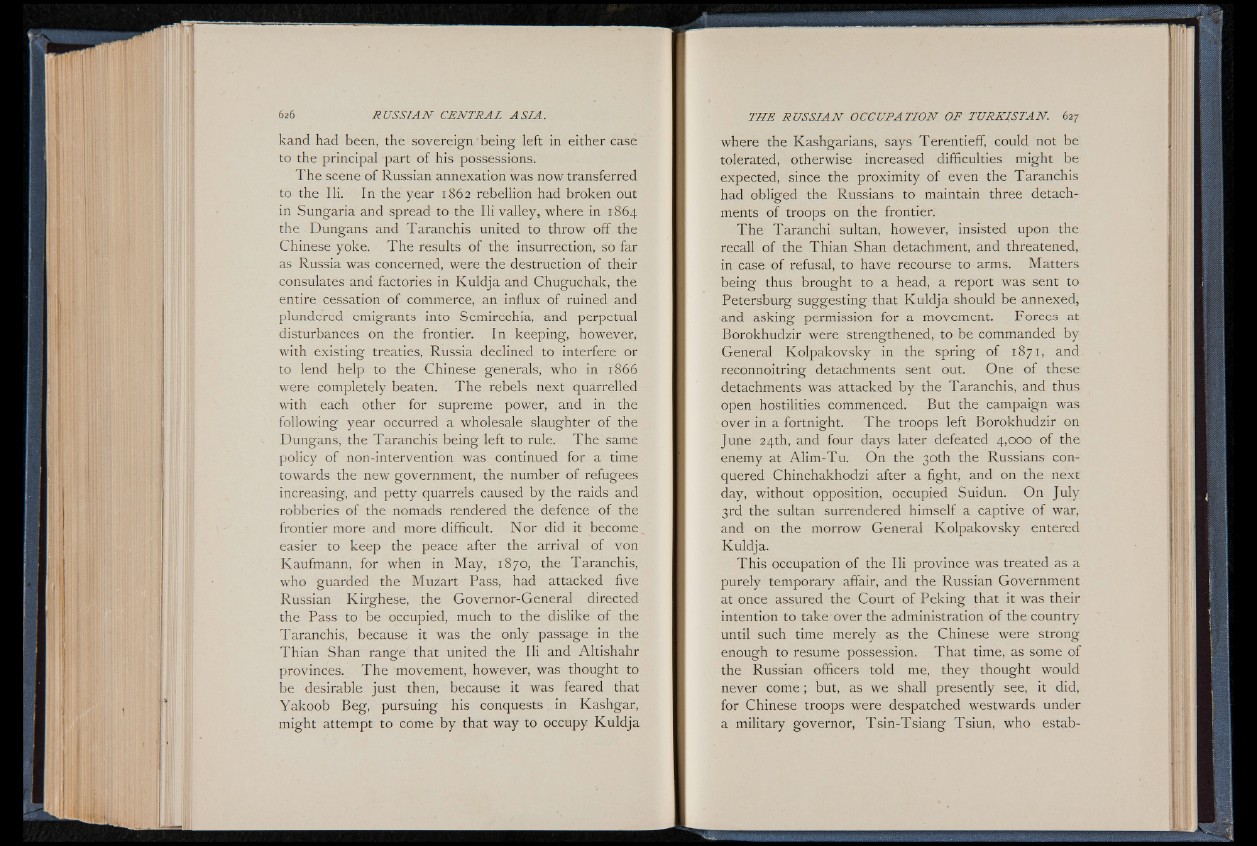
kand had been, the sovereign'being left in either case
to the principal part of his possessions.
The scene of Russian annexation was now transferred
to the Ili. In the year 1862 rebellion had broken out
in Sungaria and spread to the Ili valley, where in 1864
the Dungans and Taranchis united to throw off the
Chinese yoke. The results of the insurrection, so far
as Russia was concerned, were the destruction of their
consulates and factories in Kuldja and Chuguchak, the
entire cessation of commerce, an influx of ruined and
plundered emigrants into Semirechia, and perpetual
disturbances on the frontier. In keeping, however,
with existing treaties, Russia declined to interfere or
to lend help to the Chinese generals, who in 1866
were completely beaten. The rebels next quarrelled
with each other for supreme power, and in the
following year occurred a wholesale slaughter of the
Dungans, the Taranchis being left to rule. The same
policy of non-intervention was continued for a time
towards the new government, the number of refugees
increasing, and petty quarrels caused by the raids and
robberies of the nomads rendered the defence of the
frontier more and more difficult. Nor did it become
easier to keep the peace after the arrival of von
Kaufmann, for when in May, 1870, the Taranchis,
who guarded the Muzart Pass, had attacked five
Russian Kirghese, the Governor-General directed
the Pass to be occupied, much to the dislike of the
Taranchis, because it was the only passage in the
Thian Shan range that united the Ili and Altishahr
provinces. The movement, however, was thought to
be desirable just then, because it was feared that
Yakoob Beg, pursuing his conquests in Kashgar,
might attempt to come by that way to occupy Kuldja
where the Kashgarians, says Terentieff, could not be
tolerated, otherwise increased difficulties might be
expected, since the proximity of even the Taranchis
had obliged the Russians to maintain three detachments
of troops on the frontier.
The Taranchi sultan, however, insisted upon the
recall of the Thian Shan detachment, and threatened,
in case of refusal, to have recourse to arms. Matters
being thus brought to a head, a report was sent to
Petersburg suggesting that Kuldja should be annexed,
and asking permission for a movement. Forces at
Borokhudzir were strengthened, to be commanded by
General Kolpakovsky in the spring of 1871, and
reconnoitring detachments sent out. One of these
detachments was attacked by the Taranchis, and thus
open hostilities commenced. But the campaign was
over in a fortnight. The troops left Borokhudzir on
Juñe 24th, and four days later defeated 4,000 of the
enemy at Alim-Tu. On the 30th the Russians conquered
Chinchakhodzi after a fight, and on the next
day, without opposition, occupied Suidun. On July
3rd the sultan surrendered himself a captive of war,
and on the morrow General Kolpakovsky entered
Kuldja.
This occupation of the Ili province was treated as a
purely temporary affair, and the Russian Government
at once assured the Court of Peking that it was their
intention to take over the administration of the country
until such time merely as the Chinese were strong
enough to resume possession. That time, as some of
the Russian officers told me, they thought would
never come ; but, as we shall presently see, it did,
for Chinese troops were despatched westwards under
a military governor, Tsin-Tsiang Tsiun, who estab